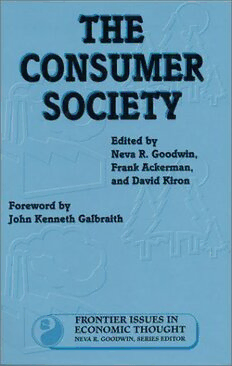
The Consumer Society PDF
428 Pages·1996·2.65 MB·English
Most books are stored in the elastic cloud where traffic is expensive. For this reason, we have a limit on daily download.
Preview The Consumer Society
Description:
The developed countries, particularly the United States, consume a disproportionate share of the world's resources, yet high and rising levels of consumption do not neccessarily lead to greater satisfaction, security or well-being, even for affluent consumers. This text provides brief summaries of the most important and influential writings on the environmental, moral and social implications of a consumer society and consumer lifestyles. Each section consists of ten to twelve summaries of critical writings in a specific area, with an introductory essay that outlines the state of knowledge in that area and indicates where further research is needed. Sections cover: scope and definition; consumption in the affluent society; family, gender and socialization; the history of consumerism; foundations of economic theory; perpetuating consumer culture - media, advertising and wants creation; consumption and the environment; globalization and consumer culture; and visions of an alternative. This book is the second volume in the "Frontier Issues in Economic Thought" series, which provides surveys of the most significant writings in emergent areas of economics. The series brings together economists, sociologists, psychologists and philosphers to develop analyses that challenge and enrich the dominant neoclassical paradigm.
See more
The list of books you might like
Most books are stored in the elastic cloud where traffic is expensive. For this reason, we have a limit on daily download.
